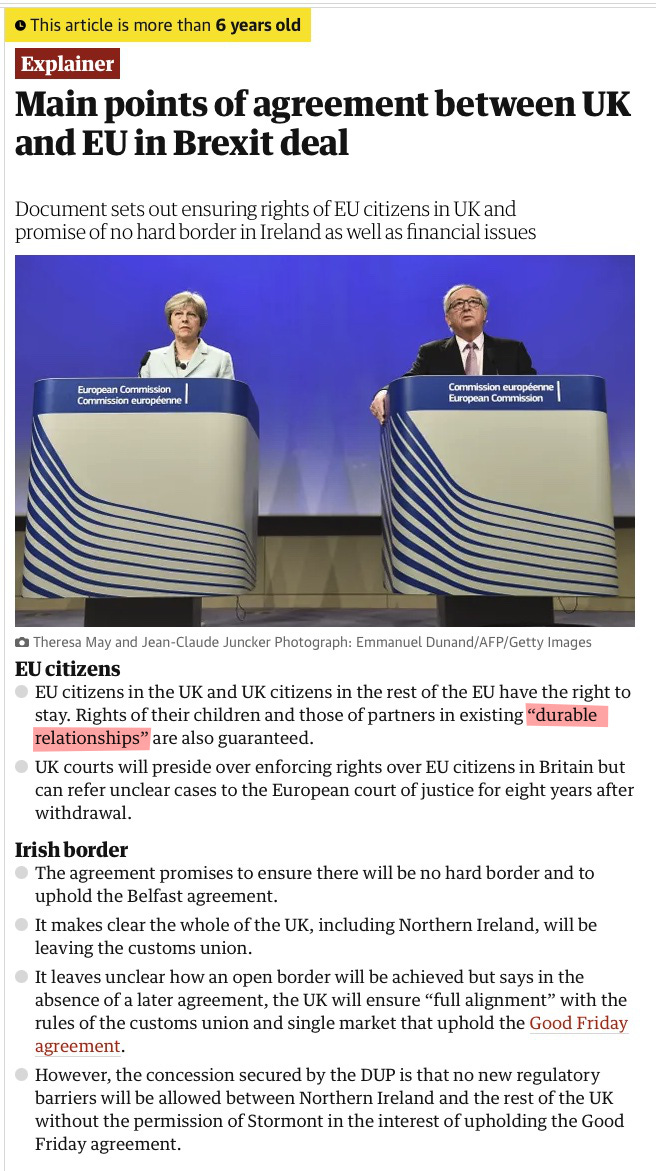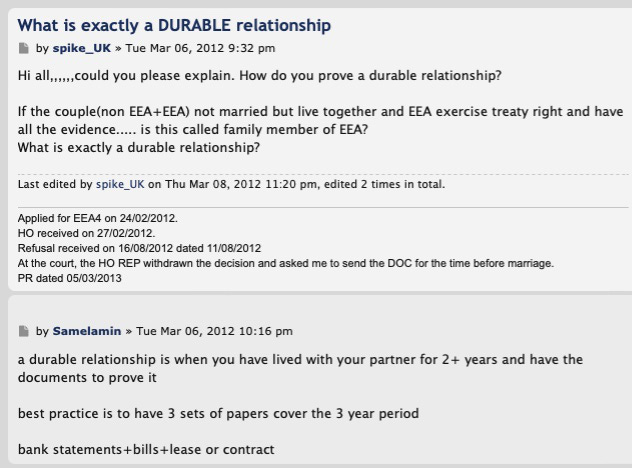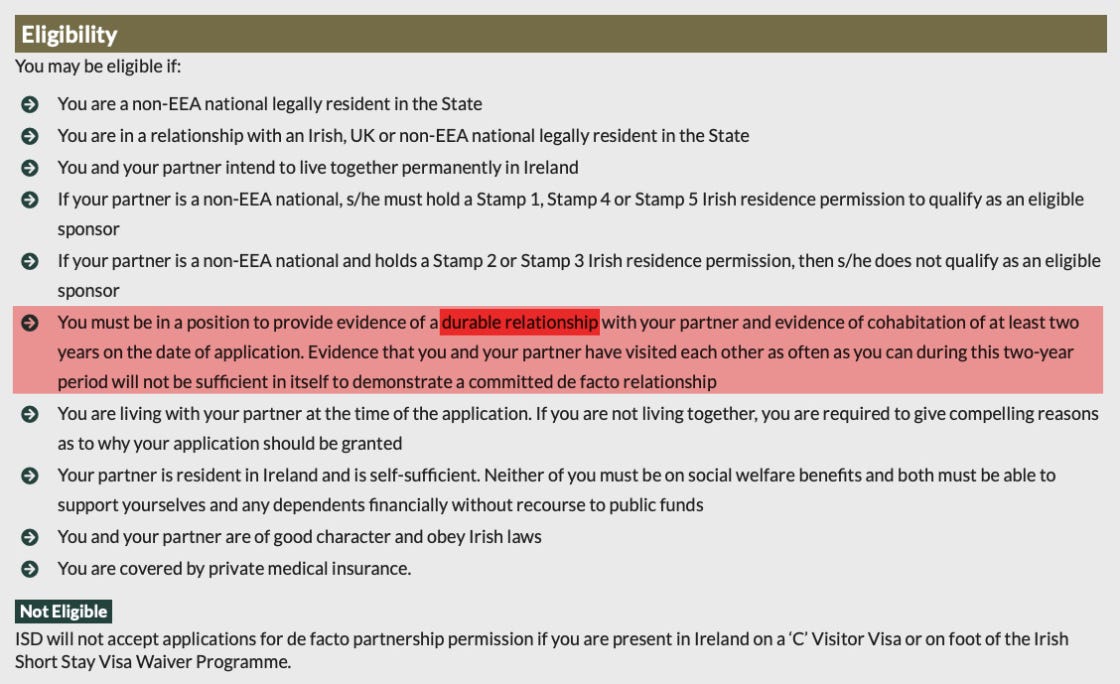Brexit & Ireland
Is the March 8th referendum the Irish establishments Brexit and Did the UK recognition of durable relationships for immigration purposes, act as a compounding factor resulting in Brexit?
These are questions that arose when researching and writing Part I, as I realised the UK had an established history of recognising and managing durable relationships within immigration polices.
However, it is not clear if that any of these questions will be answered here, but it has lead to some important discoveries when considering the dynamic Brexit had on the EU/UK’s recognition of Durable Relationships, but also Ireland’s, and so we shall start with this Guardian reporting from 6 years ago, on the main points of the Brexit agreement.
Do you see it?

To know more about the UK implemented EU directive originating “durable relationships” for immigration purposes, then read the UK gov EU Settlement Scheme: evidence of relationship / How to provide evidence that you’re a family member of an EEA or Swiss or person of Northern Ireland
What the Commission Published
The Brexit & Ireland webpage on the European Commission website, has under the “Citizens Rights” heading, a specific paragraph clarifying the status of those in a durable relationships as part of the agreement.
It also protects their family members (such as current spouses and registered partners, parents, grandparents, children, grandchildren and people in existing durable relationships) who are granted rights under EU law to join their family member in the future.
Source: European Commission
“What is exactly a…”
Typically those seeking to immigrate to the UK would search online, for answers to their questions such as “What is exactly a DURABLE relationship” , but what might surprise some, is such questions were posed as far back 2012 online.

Ever more relevant, in 2013 a user on the same forum posted a topic simply titled Durable Relationship relating specifically to Irish immigration treatment of durable relationships and more;
Just been looking for information about “durable relationship”, anyway I noticed here that the Irish have changed the rules so now have actually got to have been living together for at least 2 years as of September.
http://www.inis.gov.ie/en/INIS/Pages/WP07000278
For applications received on or after Monday 23rd September 2013, in order to assess whether the couple is in a genuine long-term relationship, it will be necessary for the couple to provide dated documentary evidence of cohabitation for at least the preceding 2 years immediately prior to the date of application. Partners who are not living together at the time of the Application will be required to give compelling reasons for this.
I feel this needs a serious challenge because in effect its preventing free movement.
There is, as we know, nothing in 2004/38/EC that defines “durable relationship”
The posted link no longer works but directs to www.irishimmigration.ie and if you search using the term “durable relationship” you find many results, with one of the the top being;
De facto partner of an Irish or non-EEA national
Introduction
Typically, an application for a de facto immigration permit is made from outside the State. However, it can be granted under certain conditions to the partner of a person who has a current permission to reside in Ireland. That person is called the eligible sponsor and can be an Irish national, a non-EEA national legally resident in the State or a UK national living in Ireland.
If a person is ordinarily resident outside of the State and wishes to enter the State as the De Facto Partner of an Irish National or a CSEP holder, they should be applying for pre clearance from outside of the State.
The information on this page relates to applicants who have a current permission in the State who wish to obtain a permission based on their de facto relationship.
What is a de facto relationship?
For the purposes of this document a de facto relationship is a cohabiting relationship similar to marriage duly attested. You must be residing together for at least 2 years prior to submitting your application.
Source: immigraiton.ie
What is a exactly de facto relationship?
The website page further down lists “durable relationship” as a point of eligibility in a de facto relationshipapplication, must we assume then a de facto relationship is also a “durable relationships”

Ok, with some more searching we find there are over 100 results for “durable relationship” on irishimmigration.ie, for the purposes of brevity let’s look at a few more results examples to get an overview;
De facto partner of an Irish national
If you are the de facto partner of an Irish citizen please read below about how you may apply to live in Ireland and what you may do while living in Ireland.
Source: irishimmigration.ie
Another result
Joining your UK national family member
Introduction
If you wish to join your UK national family member in Ireland please read below for any information you may require and for the conditions attached to this type of application.
Who should apply?
This scheme allows certain non-EEA nationals to apply to join their UK national family member in Ireland. Please note that there is no automatic entitlement to family reunification but UK nationals will be permitted to act as a sponsor of such applications.
Source: irishimmigration.ie
At this point you might be wondering,
Why are we being asked to put the term “durable relationship” in Article 41?
It is a good question that generates even more questions but for now let’s press on.
More Online Anecdotes
Immigration discussion websites, and provide the voting Irish, realworld insights into the kind of complex dilemmas faced by immigrants, or the kind of chaos awaiting a home in the ccourts, here another example from 2017
Unmarried partners – how to prove durable relationship
I am an EEA citizen being in a long distance relationship with Moroccan for 3 years now. I am staying in UK for 7 years and working here. We would like to apply for EEA Family Permit for my fiance to join me in UK.
I was advised that we can apply on a base of being in a durable relationship for more than 2 years now.
I was told that my passport showing stamps when visiting my partner in Morocco and our pictures will be enough to prove this durable relationship. I am concerned about this as read previously that letters proving living together and other official docs are required.
I was also advised that we can apply for the EEA permit for an extended family member as he is my fiance.
Could you please advise if above scenarios sounds right to you? Do you think we can prove durable relationship on a basis of stamps in my passport and pictures? Anyone has a previous experience?
Additionally, is it correct (just saw it today on this forum) that is application for EEA is refused we can’t appeal?
Please help me as I am confused now and I would like my fiance to be with me asap. Just don’t know which way is the best to take?Source: immigrationboards.com
“No, EU Settlement Scheme Durable Partners DON’T Have to Have Lived Together for 2 Years”
…you don’t need to have lived together for 2 years to qualify as durable partners under the EUSS, you just need to be able to prove that your relationship is “durable”.
Source: Reddit
The full 3 year old post be read here
Durable Relationships to the Rescue
According to this source “the identity of the people involved in all our case studies has been anonymised. The facts of each case are however true.” and in this specific case the durable relationship channel, was pivotal in the successful immigration outcome for the applicants
Luis is a Colombian national who came to the UK to study in 2009. While here he met Magda, a Polish national who was working at Luis’s college as a part of the reception staff. They soon fell in love, and some six months after Luis arrived in the UK they started living together.
When Luis’s visa was coming to an end he made an application to remain in the UK to work, not knowing that this would only be possible if his potential employers were registered sponsors with the Home Office, and permitted to take on overseas employees. The Home Office took five months to make a decision on his case, and then it was refused. Though Luis had a right of appeal he decided instead to put in an application based on his relationship with Magda. Though Luis was in the UK legally while his application was with the Home Office, once the deadline to appeal was over and he hadn’t lodged an appeal he became an overstayer.
Luis and Magda decided to lodge the application themselves, without seeking legal help, and so they mistakenly completed the wrong form and made the application under UK law. Seven months later, this application too was refused, because Magda is not settled in the UK. This time there was no right of appeal. It was at this stage that Luis and Magda came to us for help. They had been living together for close to three years by that time.
We explained their options to them, and they instructed us to act for them in an application under EEA law, on the basis that they were in a durable relationship. They had very few documents to show that they had been living together for three years, but we suggested alternative evidence which they were able to get together, and we submitted this, along with detailed legal representations setting out Luis’s immigration history and the history of their relationship, and making arguments as to why he should be issued with documentation under EEA law.
The application was successful and Luis was issued with a Residence Card valid for five years. We last heard from him when he sent us an email to say that he and Magda had twin sons, born on 01 November 2014!
Source: Global Immigration Solutions
Is Immigration the new Marriage and are Irish citizens already in recognised durable relationships?
It’s a crazy world and “Love knows no borders” according to one website in the UK, catering to the Unmarried Partner Visa market, of which Irish people, or more correctly Irish citizens could eligible for UK recognised durable relationships
If you are in a committed relationship, akin to marriage, with a British/Irish citizen or a person in the UK with Settlement (Indefinite Leave to Remain or Settled Status), you may be able to join your partner in the UK via the Unmarried Partner Visa route.
Source: https://clarkslegal.com/insights/articles/love-knows-no-borders-navigating-partner-visas-unmarried-partner-visa/
If you are reading this as I am; Then it appears an Irish citizen hypothetically speaking, enters the UK via the Common Travel Area, struck up a durable relationship and have that recognised in the Uk, then both being able remain in the UK and one assumes can now both enjoy the Common Travel area and head back over to Ireland to live. Which means there may already be legally recognised durable relationship in Ireland via the UK
Durable Relationships in waiting.
Thinking in other terms, if “durable relationship” is inserted into the Irish constitution, all those pre-existing UK recognised durable relationships would surely now have instant free passage to enter Ireland over-night on par with married couples, possibly without any wait time or other criteria in order to remain resident, could they then apply for PPS, get on the housing list, apply for other social housing supports like HAP, maybe apply for a medical card, oh and some family re-unification, for good measure.
Well there is so much to compute but the sign off really gives the game away;
In the end, the UK Unmarried Partner Visa creates a way for couples to conquer the hurdles of immigration. Love, after all, knows no borders.
We might be familiar with cases say form the places liek the US, where an illegal marries a US citizen and is granted rights to remain and are essentially legalised through marriage, but here we have the cart before the horse, and drops the bar or is it extends the bar beyond the borders, where the process of immigration itself with become a 2-for1.
The consequences here equate to nothing but the flood gates being opened to what is a Pandora box level of chaos for the world and it’s durable relationship to enter.
Durable Relationship Legal Advice online
Online legal blog
PRACTICAL IMPORTANCE OF THE DEFINITION
The difficulty with application involving ‘durable’ partners is that Home Office caseworkers tend to focus on the 2 years cohabitation and the documentary evidence of the residence together, rather than analysing all the evidence provided by applicants to assess whether the durable relationship existed by end of December 2020. Therefore, applicants who do not provide evidence of 2 years cohabitation completed by end of December 2020, may face a refusal and have to challenge the Home Office decision by appealing the case to Immigration Tribunals.
Source: Thaxted Legal
On face value it looks as if Ireland and the UK have more or less mirrored their implementation and treatment of of the EU 04/06 directives pertaining to “durable relationships”, and so was it the purpose of the 2017 High Court case highlighted in Part II, an attempt to force via Irish Law to put required ( ideologically fuelled agenda driven legal definitions lacking in place).
The Supreme court upheld the status Quo in 2019 – and so it has to be asked is this a very crude go for broke method to possibly harmonise UK & Ireland immigration policies as part of a bigger and part of a broader and deeper outcome, one that might be a working toward an All Ireland or All Island/s for immigrants in rela travel terms but not in name. Next stop dismantle the Republic and unite the Island under a new name, new flag new rules.
Or, further still is it a combined effort to fully undo the negative freedom of movement, effect of Brexit in real world movement of people terms, again Brexit existing in name only.
r, in other words is this referendum a serious stepping stone toward reunification of Britain and Ireland. and thus Britain back in Europe using Ireland as the back door!
While outside the scope of this piece, more informed comments on this would be very welcomed.
Under-Information
In conclusion. You can hardly turn or scroll down a page of the political media in Ireland without banging your head off the phrases “disinformation, misinformation and rumours”, a caveat used ad-nauseam in most reportage on the issues of immigration and the current referendum.
Yet, as you can see from the various sources extensively cited in this post. The real danger is more apparent of a public being totally under-informed, so the correct question to ask when deciding on the proposal:
Is there, in the very short space of time allocated to the public discourse, a concerted effort of omission on the part of the political media and politicians to carefully avoid discussing the durable history of durable relationships, while often deflecting with non-sequiturs such as “let the courts decide!” or emotive pleas to “recognise and protect all families” when pressed further on the purpose of “durable relationships” it’s definition and even insight to it’s origins, in spite of the UK & Ireland’s already working immigration framework recognising “durable relationships”, then erring on the side of caution would be prudent to assume the answer being yes, and so it must be considered the sins of omission are being carried with the intended purpose to create and maintain the pretence of urgent necessity, supposedly for something we lack, when we already have it in implemented in abundance within our the immigration systems.
It would not be unreasonable to consider the changing of the constitution on a foundational article such as Article 41 “The Family”, in the context of a information landscape that is saved by sustained and orchestrated omissions, equating to a type of Constitutional vandalism by proxy but, more thoroughly a direct assault and attack on the social stability and cohesion of the Irish nation, in part due to the immigration floodgate potential with our nearest neighbour the UK.
If you feel you have been consistently under-informed or now realise you have, then your only option is to vote No and No.
The the reaction of the proposers in defeat, will clarify the nature of the bullet the nation will have avoided this time round, until such a time the current or new political proposers manage to load the barrel for a second shot.
Let us not be tricked into destroying Ireland and the Irish Nation for want of information.